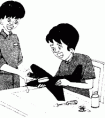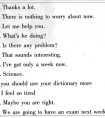Zhang: Hi, Amy. How are you?Amy: Hi, Zhang. I'm glad to see you.Zhang: Me too. My friend Mary said you had 小题1:___________ ill for a few days. Are you O-九年级英语
题文
Zhang: Hi, Amy. How are you? Amy: Hi, Zhang. I'm glad to see you. Zhang: Me too. My friend Mary said you had 小题1:___________ ill for a few days. Are you OK? Amy: I am feeling well now. Thanks. But today I was very upset. Zhang: Why? What小题2:___________ to you? Amy: First of all, my alarm clock didn’t go off this morning. So I was late at the bus stop. The bus had already left 小题3:____________ I got there. Then I had to walk to school. Zhang: That's a long walk. Amy: Yeah. And then it started 小题4:__ and I'd forgotten my umbrella. Zhang: Oh no! Did you get wet? Amy: Yes, I was late and wet. You know we will have a physics test tomorrow but I missed the class. Zhang: I am sorry to hear that. You did have a bad day. But I am sure you will get good 小题5:___________ in the physics test. You are always good at it. Amy: Thanks. I will try my best. |
答案
小题1:been 小题2:happened 小题3:when 小题4:raining 小题5:grades |
试题分析: 小题1:句意:我朋友玛丽说你病了好几天了。这个宾语从句是完成时态had+动词过去分词,生病了be ill,be过去分词是been. 小题2:句意:你怎么了?据上文But today I was very upset但我今天很烦,可以判断应该问What happened to you? 你怎么了,故填happened。 小题3:句意:当我到那儿的时候,火车已经离开了。根据句意故填when,它引导一个时间状语从句。 小题4:句意:然后天开始下起雨来。据and I'd forgotten my umbrella. Zhang: Oh no! Did you get wet? Amy:Yes, I was late and wet.可知是天开始下起雨来,start doing开始做…… 小题5:句意:但我确信在物理测试中你会取得好成绩的。据You are always good at it.可知,这个人擅长物理,可知他会取得好的成绩。 |
据专家权威分析,试题“Zhang: Hi, Amy. How are you?Amy: Hi, Zhang. I'm glad to ..”主要考查你对 情景交际,日常用语、谚语 等考点的理解。关于这些考点的“档案”如下:
情景交际日常用语、谚语
考点名称:情景交际
- 情景交际:
也叫口语应用,试题根据对话的基本形式是一问一答的特点,通过提供一定的语境,将语言放在交际的实际情景中去考查。
它所涉及的内容多是初中英语课本中出现过的与学生学习、生活相联系、实用性强的内容。
它既考查特定交际场合使用的表达方式,也通过语境考查词汇和语法知识的运用。 - 情景交际题注意事项:
1.所补全的对话内容必须能使上、下文连贯一致,因而必须瞻前顾后、全盘考虑,不能仅看上一个问句就选择答句,或仅根据下文中的答句就补全它的问句,否则容易造成逻辑错误。
2. 做题前应注意试题前面是否有中文或英语的背景提示。这些背景提示是确定话题内容的重要依据,不可疏忽带过。
3. 在选择过程中考生应注意把已选出的选项划去,避免重复选择的错误。
4. 做题时要先易后难,一时难以确定不要勉强先做,否则易造成连锁错误。 - 解题思路与技巧:
1. 通览全文,领会大意,揣摩话题。解题时应先跳过空格通览全文,了解对话大意,根据对大意的把握,判定语境,揣摩话题。
2. 根据语境,细读选项,选择答案。在把握话题和语境的基础上,针对对话的每一空白处,细读所提供的选项,认真分析它们之间的异同,依据对话有关情景内容,选择正确的答案。
3.通盘考虑,前后联想,先易后难。要从对话整体理解出发,依照上、下问答的逻辑顺序来考虑所选择的答案,不可不顾前后顺序,孤立地就上句就补下句,这样可能出现所补句子符合上文而不符合下文的情况。要先解决有把握的、容易的,再回头补选较难的。
4.通读对话,义形结合,验证答案。将对话补全之后,再将整段对话通读一遍,逐一验证答案。所选的答案不仅语义上要符合语境,而且要保证语言正确,做到说话得体。
考点名称:日常用语、谚语
- 日常用语:
就是日常生活中的交际用语,如Thank you. Sorry.等
谚语:
即是人们生活中常用的现成的话。
谚语类似成语,但口语性强,通俗易懂,而且一般都表达一个完整的意思,形式上差不多都是一两个短句。
例如:Helaughsbestwholaughslast.谁笑到最后,谁就笑得最好。
Nopains,nogains.没有付出,就没有收获。 英语日常交际用语分类:
打招呼与告别用语(Greeting and Saying Good-bye)
1.-How are you ?
-I’m fine, thanks.
2. -Nice to meet you.
-Nice to meet you, too.谈论颜色(Talking about colour)
1. -What colour is it?
-It’s red.
2. -What’s you favourite colour, Jenny?
-My favourite colour is blue.
3. -How many colours do you like?
-Three.谈论高度(Talking about height)
1. -Are you short or tall?
-I’m short/tall.
2. -How tall am I, Mr Wood?
-You’re 1.6 metres tall.看病用语(Seeing a doctor)
1. -What’s the matter?
-I cut my knee. It hurts.就餐用语(Having meals)
1. -Would you like some dumpling?
-No, thanks./ Yes please.
2. I’d like porridge for breakfast.
3. It’s /Thery’re delicious.
4. What would you like for supper?
5. -Are you ready to order?
-Yes, please. I’d like…….谈论天气(Talking about weather)
1 -How is the weather today?/ What’s the weather like today?
-It’ sunny rainy snowy windy.
2. -Is it snowy?
- No , it’s hot today.
3. -what’s the temperature?
- It’s 0 degrees.
4. -Is it rainy?
- 最新内容
- 相关内容
- 网友推荐
- 图文推荐
| [家长教育] 孩子为什么会和父母感情疏离? (2019-07-14) |
| [教师分享] 给远方姐姐的一封信 (2018-11-07) |
| [教师分享] 伸缩门 (2018-11-07) |
| [教师分享] 回家乡 (2018-11-07) |
| [教师分享] 是风味也是人间 (2018-11-07) |
| [教师分享] 一句格言的启示 (2018-11-07) |
| [教师分享] 无规矩不成方圆 (2018-11-07) |
| [教师分享] 第十届全国教育名家论坛有感(二) (2018-11-07) |
| [教师分享] 贪玩的小狗 (2018-11-07) |
| [教师分享] 未命名文章 (2018-11-07) |








